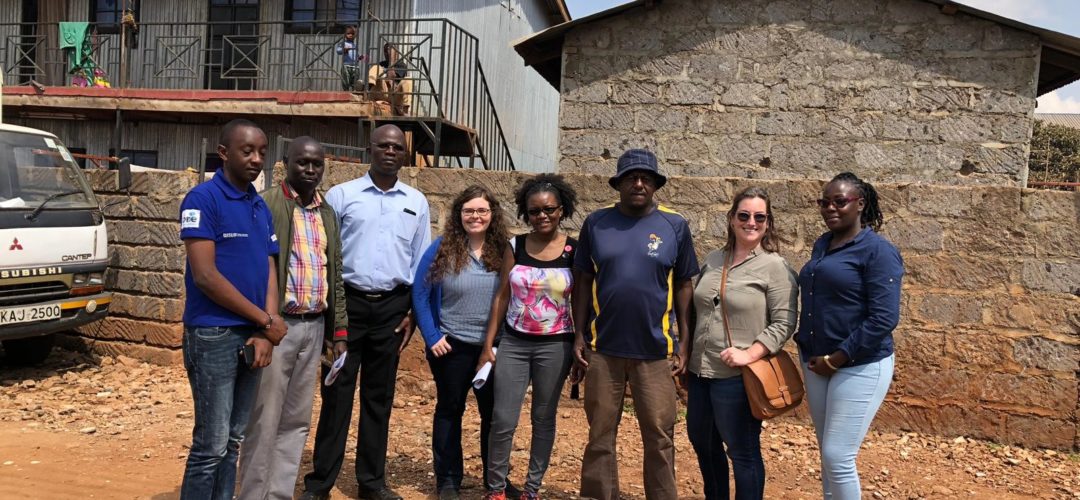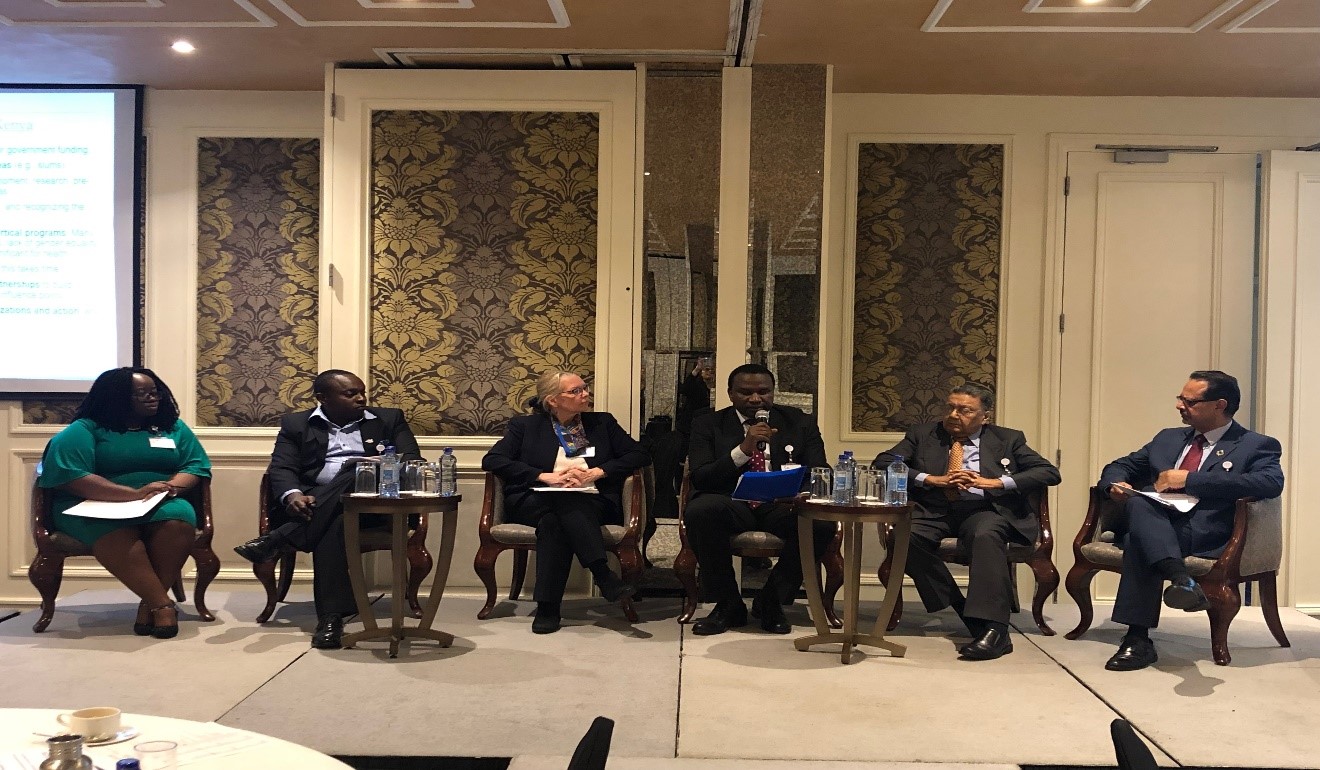Leveraging Partnerships to Shift Systems in Kenya
August 28, 2019 - By Kelly Diggins
“Development is not instant coffee; it takes time,” Arif Neky of the United Nations and SDG Partnerships Platform said during Rockefeller Philanthropy Advisors’ 1.5 day workshop using the findings from the Scaling Solutions initiative, which examines funders’ role in supporting grantees to scale solutions and impact and contribute to systems change. In 2018, Kenya’s government launched a universal health coverage scheme as part of Kenya’s “Big 4” goals in four pilot counties. If successful, the idea is to replicate and scale up the process for the other 43 counties. This highlights Kenya’s prioritization in achieving SDG 3 – ensure healthy lives and promote well-being for all at all ages. “The trifecta to achieve universal healthcare is 1) partnerships, 2) political will, and 3) appropriate policies,” said Neky.

Focusing on this collective agenda, representatives from all stakeholders that work in health and related sectors – government, United Nations, businesses, foundations, and non-profit organizations – participated in this workshop to delve into opportunities and challenges in achieving this ambitious goal – universal health coverage for Kenya. Together, we examined how our efforts shared the same end goal, how to leverage the strengths of each sector to help create the systemic change needed to reach the goal, and what each sector needed from the others to help achieve the goal and the desired impact. Discussions also focused on scaling an organization’s work and the need for cross-sectoral collaboration. As Ivy Syovata of Philips said, “Silos are not working, and if we are talking about health for all, we have to break the silos and work together.” Bridging work between different sectors helps with resources, behavior change, and shifting norms and policies. When all stakeholders contribute their piece of the puzzle, once connected, they create a more complete picture of the desired outcome for all people.
When working on systems change, which is needed for shifting the healthcare system in Kenya, most successful organizations use a combination of interventions to make that leap from incremental change to transformational change. Two organizations that are driving change within the communities where they work are Shining Hope for Communities (SHOFCO) and Water & Sanitation for the Urban Poor (WSUP). Both of these organizations work at the community level to engage communities and create buy-in so that the solutions offered are more sustainable. Additionally, these two organization have partnered with different sectors of the government, which is another lever towards shifting the paradigm, creating more alignment between stakeholders, and contributing to sustainability.
SHOFCO was started in 2004 by Kennedy Odede, who grew up in Kibera, one of the largest urban slums in Africa. Since Kennedy was from the slum himself, he knew what his community needed, as well as the possibilities available for meaningful change, and was able to quickly gain trust from other community members. In July, I traveled to Kibera and was met by Steven Onyango of SHOFCO. Steven was also born and raised in Kibera, had received SHOFCO services while growing up, volunteered with the organization, and now is an employee of SHOFCO. Steven walked me through the slum, pointing out the thin green hoses that bring siphoned water from the city water pipes since they do not get running water, the mounds of trash because there is limited garbage collection, and the stores along the train tracks that pass through the slum that could be forced to relocate any day if the government decides it wants the land. SHOFCO focuses on three main areas. The first is providing essential services like quality healthcare, water and sanitation, sustainable livelihoods and gender-based violence prevention. The second is community mobilization to connect marginalized slum communities with government services, and the third is girls leadership and education. On my visit, Steven took me to the different SHOFCO facilities and introduced me to the program leaders for these different issue areas.
The last building we visited was SHOFCO’s main clinic, which was filled with patients because it is the only local clinic and provides free services. This one clinic in Kibera serves approximately 400 patients every day. SHOFCO runs a total of seven clinics across the slums of Kibera and Mathare and served nearly 350,000 people last year. They are also able to provide a pharmacy and labs for the community. The Ministry of Health has partnered with SHOFCO to provide medicine and vaccines to their clinics. Through this partnership, Kibera residents have access to healthcare that was previously too expensive or too far to access, and the Ministry of Health is extending its reach of people served.

The next day, I visited two different low-income areas with WSUP; one focused on their sanitation work and the other focused on their clean water initiative. WSUP has been working in informal settlements of Nairobi since 2008. The first area we visited was Kaptagat, where WSUP has been helping address the issue that only one third of urban residents have access to at least a basic sanitation service. In Kaptagat, we were met by the village chief, who has helped promote WSUP’s solutions within the community. WSUP also partnered with Nairobi City Water and Sewerage Company (NCWSC) to connect Kaptagat to the city’s sewage system. Before, this area had open sewage in the dirt pathways of the town. As WSUP started working with the community and teaching best practices, they were able to provide services for a truck to remove the sewage at a cost. Now that the area has been fully connected to Nairobi’s sewage system, the town no longer has to pay for sewage removal and the smell has disappeared. We also visited Githogoro to see the prepaid clean water dispensers. Before entering the town, we stopped to introduce ourselves to the town elder. In Githogoro, the water dispensers were very popular; throughout my time in the town, I never saw a dispenser without a line. Community members would bring multiple jugs to fill, scan their electronic fob, and clean water would flow. NCWSC provided the fobs for free to community members and community members can choose how much money to add onto the fob. In both Kaptagat and Githogoro, there have been market and behavior changes due to WSUP’s work and its partnership with NCWSC. The government now has an additional revenue stream. Community members are receiving and paying a nominal fee for services they didn’t have access to before, which have other health impacts in these communities.

Both SHOFCO and WSUP are doing work that supports the collective agenda of universal health coverage in Kenya and are creating ripple effects to shift the healthcare system. There is more work to be done to achieve this ambitious goal and to create more equitable access for all people, but these are important highlights of how such multi-stakeholder partnerships are key to creating systems change.
Back to News